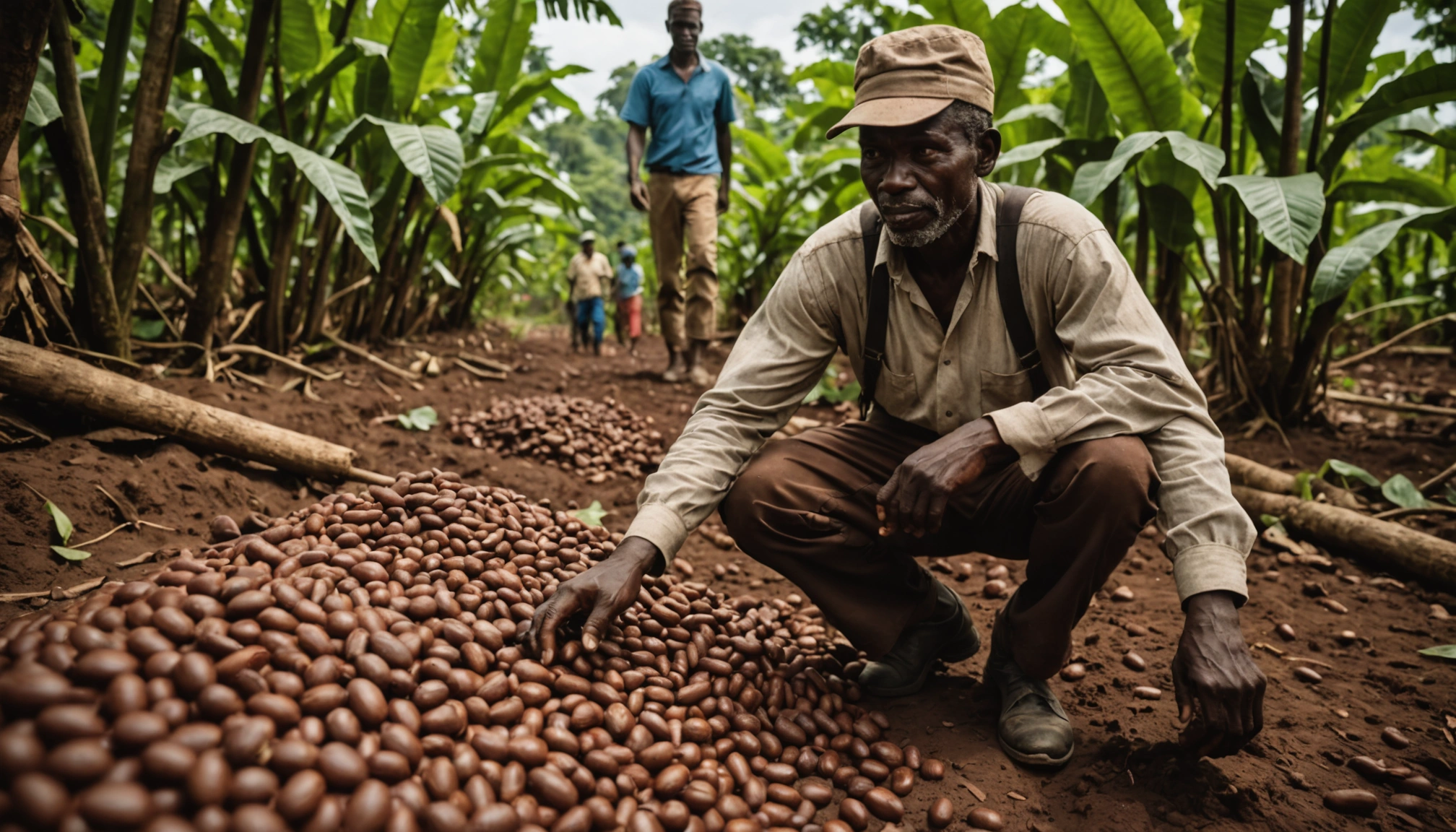Chocolate Prices Soar, But Will Cocoa Farmers Finally Benefit?

Chocolate lovers are facing a bitter reality: the cost of their favorite treat is skyrocketing. Cocoa prices have reached historic highs, driven by a confluence of factors including climate change, crop diseases, and supply chain disruptions. While chocolate companies grapple with rising costs and consumers brace for higher prices, a crucial question remains: will cocoa farmers, the backbone of the industry, finally reap the rewards?
The Perfect Storm Driving Up Cocoa Prices
The surge in cocoa prices is primarily attributed to a global supply shortage that has persisted since early 2024. West Africa, which produces approximately 70% of the world's cocoa, has been hit hard by extreme weather patterns. Excessive rainfall and rising temperatures have created poor growing conditions, leading to lower yields. The El Niño phenomenon is exacerbating the situation, threatening cocoa crops with hot and dry weather. Cocoa trees are particularly susceptible to weather changes, and warmer temperatures increase the risk of diseases, resulting in poor harvests and long-term damage to farming lands.
Adding to the woes, the Cacao Swollen Shoot Virus (CSSV) is ravaging cocoa crops in Côte d'Ivoire and Ghana, the world's top producers. This disease significantly reduces the lifespan of cocoa trees and is spreading rapidly across plantations, further limiting supply. Underinvestment in cocoa farms, political instability, and logistical challenges are also contributing to supply chain bottlenecks. Farmers are dealing with aging plantations, while stricter environmental regulations, such as the EU Deforestation Regulation, are complicating exports.
The combination of these factors has created a perfect storm, driving cocoa prices to unprecedented levels. In December 2024, cocoa prices surpassed $12,000 per metric ton, a staggering increase from around $2,000 in 2022. This surge has sent shockwaves through the chocolate industry, forcing major companies to adapt.
Chocolate Companies Pass on the Costs
Chocolate brands are grappling with higher cocoa costs, and many are passing the burden onto consumers in the form of price hikes. Companies like Cadbury and Lindt have already raised prices to offset costs, and some are considering reducing product sizes (shrinkflation) or modifying their recipes to use less cocoa. In Australia, the price of a standard chocolate bar has climbed to $7, forcing consumers to rethink their sweet tooth habits. Some analysts predict that confectionery prices are likely to increase throughout 2025.
While the chocolate confectionery market has historically experienced low elasticity of demand, supported by factors like post-pandemic recovery in gifting and increased impulse consumption, these trends may soon fade as prices continue to rise. Consumers may turn to more affordable alternatives or cut back on their chocolate purchases altogether.
The Plight of the Cocoa Farmer
Despite the soaring cocoa prices, the reality for many cocoa farmers remains bleak. Millions of cocoa farmers work extremely hard under grueling conditions, yet they do not earn a living income. On average, cocoa farmers earn just 6% of the final value of a chocolate bar. Around two-thirds of cocoa farmers earn less than $2 a day, making it challenging for them to provide for their families and jeopardizing the future of cocoa production.
A joint study by the Swiss Platform for Sustainable Cocoa (SWISSCO) and the Ghana Cocoa Board (COCOBOD) found that cocoa farmers in Ghana earn an average annual income of GHS 24,814 (USD 2,021). This means that 91% of the surveyed households earn below the adjusted Living Income Benchmark of GHS 52,970 (USD 4,315). Despite an increase in the farmgate price in April and September 2024, prices remain insufficient.
The low incomes of cocoa farmers exacerbate poverty and contribute to persistent problems like discrimination, exploitation, and deforestation. Many farmers cannot afford to hire labor, leading to child labor and forced labor. They may also encroach on protected forests for fertile land, further worsening environmental degradation. The younger generation is increasingly choosing careers outside of farming due to the poor returns, threatening the future of cocoa production.
Fair Trade and Sustainability Initiatives
Recognizing the challenges faced by cocoa farmers, various organizations and companies are working to promote fair trade and sustainable practices in the cocoa industry. Fairtrade aims to empower cocoa producers to combat poverty, strengthen their position, and take more control over their lives. Fairtrade sets a minimum price for cocoa and provides an additional premium that farmers can invest in their communities.
Several efforts to promote agroforestry and other sustainable farming practices are gaining traction. The EU traceability initiative ensures that all cocoa imported into Europe can be traced back to the farms they're sourced from, fostering fair trade, protecting the environment, and ensuring the long-term sustainability of cocoa production.
The Living Income Differential (LID), introduced by Ghana and Côte d'Ivoire in 2019, adds a premium to cocoa prices to help address farmer poverty. However, recent price surges at the global derivative markets have dwarfed this premium, highlighting the need for more effective mechanisms to ensure farmers benefit from rising prices.
Ensuring Farmers Benefit from the Boom
While cocoa prices have tripled since 2022, it is unclear whether farmers are actually receiving a fair share of the gains. The current price hikes are exacerbating the unequal distribution of value across the supply chain, with grinder-traders and chocolate manufacturers capturing more of the value.
To ensure that cocoa farmers benefit from the boom, several measures are needed:
- Paying Better Prices: Companies buying cocoa have a unique opportunity and responsibility to improve cocoa farmers' livelihoods by paying better prices for their crops.
- Investing in Sustainable Practices: Investing alongside farmers to implement more sustainable practices that reduce risks in cocoa farming, such as regenerative agriculture, can help improve soil health and productivity.
- Empowering Farmers: Supporting farmer cooperatives can give farmers more negotiating power in on-the-ground prices and access to markets.
- Promoting Living Incomes: Implementing and enforcing living income benchmarks can ensure that farmers earn enough money to cover their basic needs and live a decent life.
- Addressing Climate Change: Taking action to mitigate climate change and adapt cocoa production to a warming world is crucial for the long-term sustainability of the industry.
A Bittersweet Future?
The soaring cocoa prices present both challenges and opportunities for the chocolate industry. While consumers may face higher prices and companies grapple with rising costs, there is a chance to create a more equitable and sustainable cocoa supply chain. By paying better prices, investing in sustainable practices, and empowering farmers, the industry can ensure that cocoa farmers finally benefit from the boom and secure the future of chocolate for generations to come.
However, without concrete action, the future remains bittersweet. If the benefits of rising prices fail to reach the farmers, the industry risks perpetuating poverty, environmental degradation, and social injustice. The time to act is now, to ensure that the next chapter in the story of chocolate is one of fairness, sustainability, and shared prosperity.
Related Articles

EU Faces Uphill Battle Securing US Trade Pact Amid Trump's Tariff Threats

Myanmar's Rare Earths Boom: A Dirty Secret Fueling Green Tech
